
Statistical geneticist | Associate Prof at @DanaFarber / @harvardmed / @DFCIPopSci | Blogging at https://t.co/4D7UObBNdd
5 subscribers
How to get URL link on X (Twitter) App


 For nearly two decades the field has been asking why heritability estimates from molecular studies are so far below estimates from twin studies (). Are molecular studies missing important genetic variation or are twin studies biased by strong assumptions? nature.com/news/2008/0811…
For nearly two decades the field has been asking why heritability estimates from molecular studies are so far below estimates from twin studies (). Are molecular studies missing important genetic variation or are twin studies biased by strong assumptions? nature.com/news/2008/0811…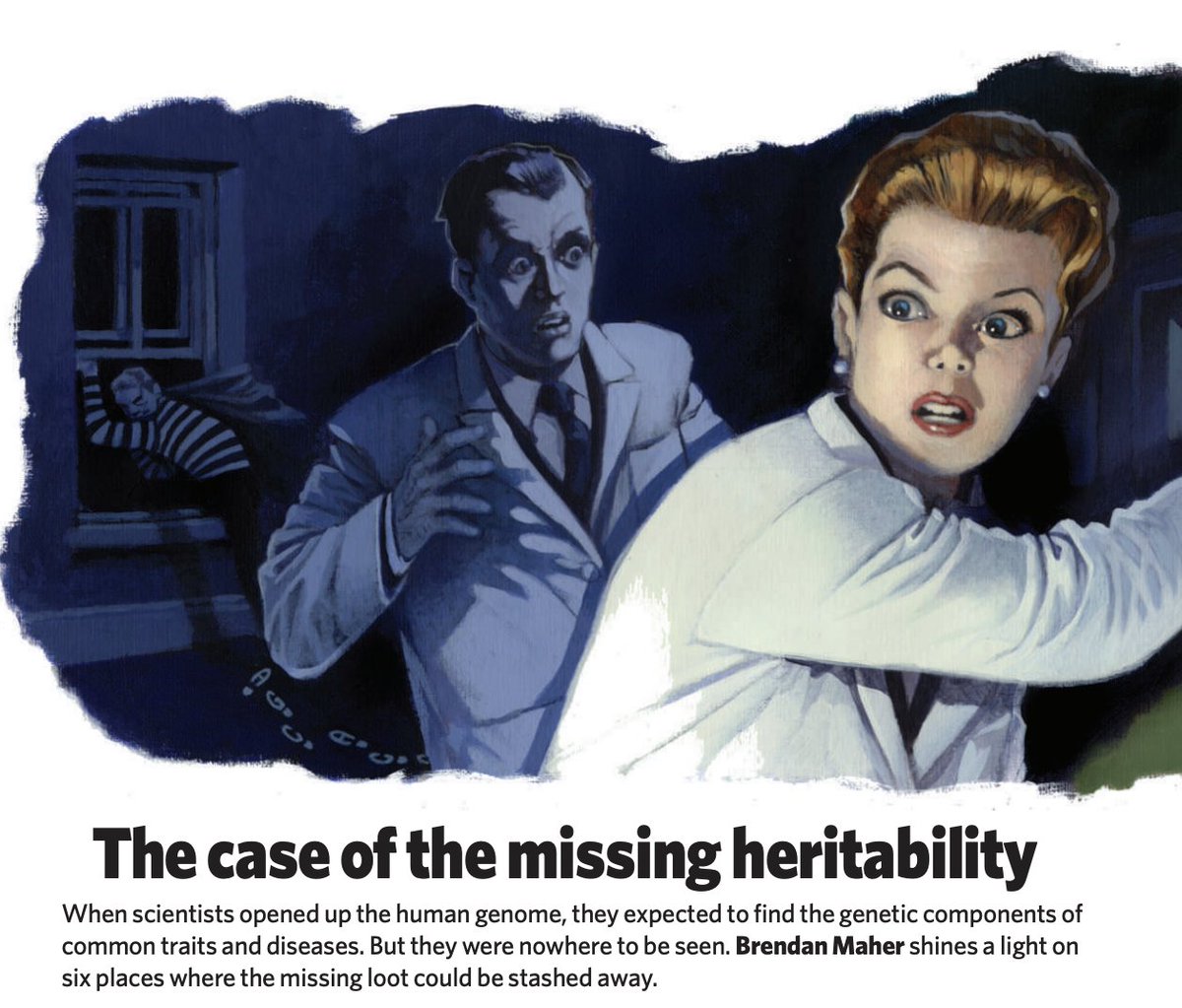
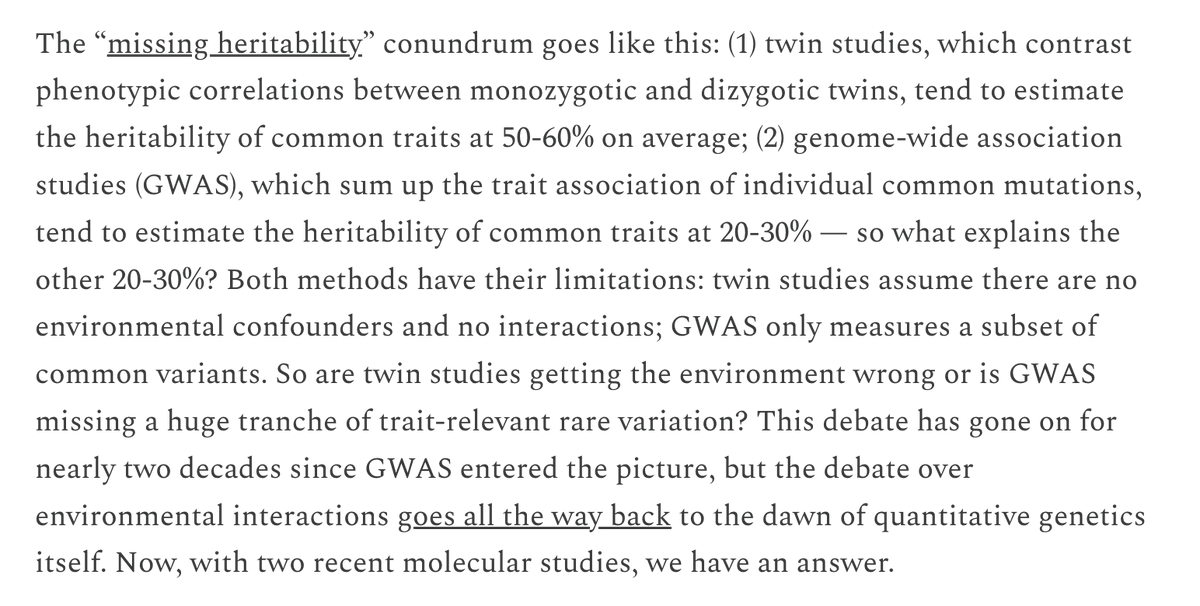

https://twitter.com/TheAtlantic/status/1977762525241381296
 Murray has, for some time now, been workshopping the excuse that progress on IQ genetics was blocked by researchers being denied the access to the relevant databases. This is patently untrue!
Murray has, for some time now, been workshopping the excuse that progress on IQ genetics was blocked by researchers being denied the access to the relevant databases. This is patently untrue! 

https://twitter.com/charlesmurray/status/1968053071847760235Revealing in that it shows how quantitative racism is a just an exercise in manipulating data to fit the preconceived conclusion. Disturbing because this time private data is being used and the results, which cannot be easily verified, are just flatly invented.

https://twitter.com/AlexTISYoung/status/1950950315395875304I wrote last year about the un-seriousness with which Nucleus approached their IQ product and the damage it could do to genetic prediction and research more broadly (). This appears to have been a broader pattern beyond IQ, extending even to rare disease.theinfinitesimal.substack.com/p/genomic-pred…

https://twitter.com/krichard121212/status/1937264266375213448The TEDS cohort used here is a very large study with high-quality cognitive assessments collected over multiple time points. It is probably the most impressive twin study of IQ to date. That means very little room for data quality / measurement error issues.



 Genetic differences between any two populations can go in *either* direction, matching the phenotypic differences we observe or going against them. Genes also interact with the environment, which makes the whole notion of "explaining" differences intractable.
Genetic differences between any two populations can go in *either* direction, matching the phenotypic differences we observe or going against them. Genes also interact with the environment, which makes the whole notion of "explaining" differences intractable. 

 It's a short paper and it surveys three core findings from the past decade of intelligence genetics. These sections follow a structure that I would cheekily call ... "make a bold claim in the title, then walk it back in the text".
It's a short paper and it surveys three core findings from the past decade of intelligence genetics. These sections follow a structure that I would cheekily call ... "make a bold claim in the title, then walk it back in the text".

 Clearly SATs are neither the only nor even the best measure we have of college success and "holistic" admissions can be "meritocratic". It's up for debate whether the additional <10% predictive variance SATs give you are worth the high-school testing industrial complex.
Clearly SATs are neither the only nor even the best measure we have of college success and "holistic" admissions can be "meritocratic". It's up for debate whether the additional <10% predictive variance SATs give you are worth the high-school testing industrial complex.

https://twitter.com/RichardHanania/status/1920962584468951418The Bell Curve, published at the peak of the 80-90's crime wave, predicted a coming dystopian urban hellscape with a "cognitive underclass" living in state-managed facilities. Not only did all this fail to materialize, but crime rates collapsed.
https://x.com/SashaGusevPosts/status/1781762773069811989


https://twitter.com/timothycbates/status/1916500806196404395First, I don't want to get too hung up on language, but TCB's tweet starts talking about "ethnicity", then shifts to "continental ancestries", and then entirely omits the largest ethnic group in the US: Hispanics. These terms have distinct definitions (). nap.nationalacademies.org/catalog/26902/…



https://twitter.com/SwipeWright/status/1915867631497707589

 Of course you can also find similar looking patterns of structure within self-reported race/ethnic groups: (a) white Europeans, (b) white Brits, (2b,c) China, (2f) Canada, (2e) Japan.
Of course you can also find similar looking patterns of structure within self-reported race/ethnic groups: (a) white Europeans, (b) white Brits, (2b,c) China, (2f) Canada, (2e) Japan. 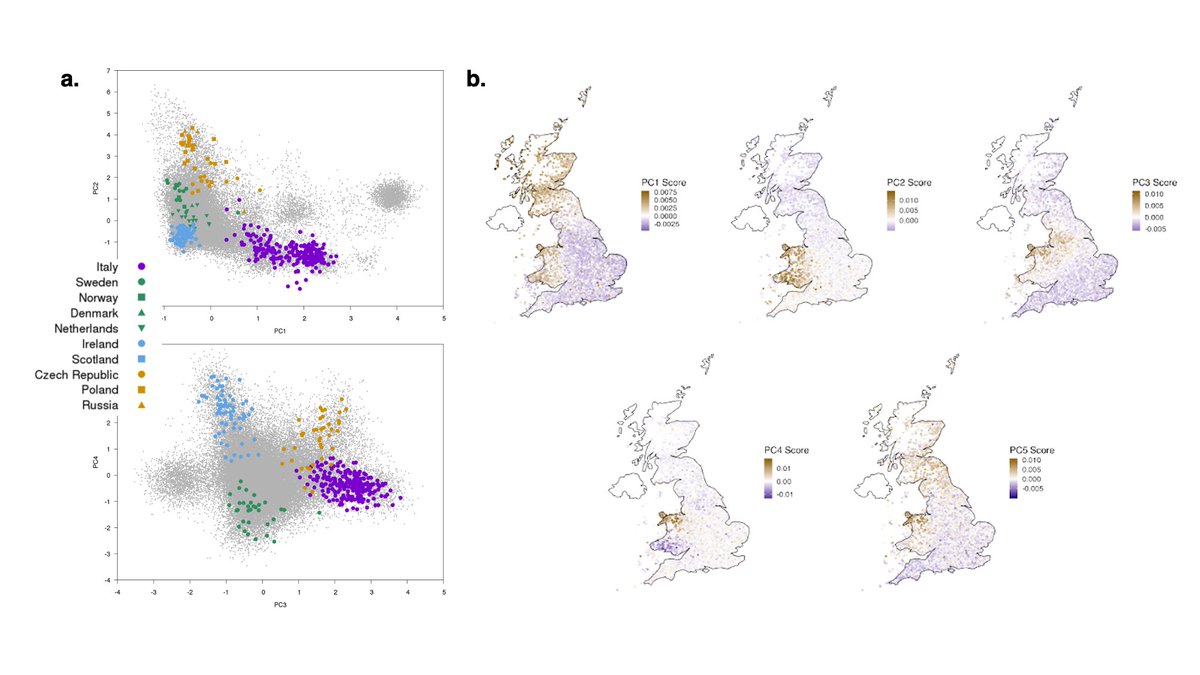


 First, stratification = genetic structure + environmental structure. If two populations have some genetic variation (e.g. due to drift) and differing environmental influences on a trait, that will induce a false/non-causal correlation between genes and the trait.
First, stratification = genetic structure + environmental structure. If two populations have some genetic variation (e.g. due to drift) and differing environmental influences on a trait, that will induce a false/non-causal correlation between genes and the trait. 

https://twitter.com/Noahpinion/status/1900561846307893621


 Judd Legum, a journalist, points out that having outlays lower than the potential award amount happens frequently, explains why, and highlights a number of specific examples. Seems like a pretty basic error, should be easy to acknowledge right?
Judd Legum, a journalist, points out that having outlays lower than the potential award amount happens frequently, explains why, and highlights a number of specific examples. Seems like a pretty basic error, should be easy to acknowledge right?https://x.com/JuddLegum/status/1900228310753230988

https://twitter.com/SashaGusevPosts/status/1806854731010027966FWIW I don't have a problem with anon accounts and enjoy interacting with many on here. I understand that people may want to partition their on-line/IRL lives. But setting up a sock puppet persona so you can aggro out on colleagues that disagree with you is pathetic.

https://twitter.com/razibkhan/status/1893177231150649495But Murray says the things that are politically correct and pleasing to that audience's ego so he regularly gets trotted out for softball interviews and never needs to exhibit any rigor.
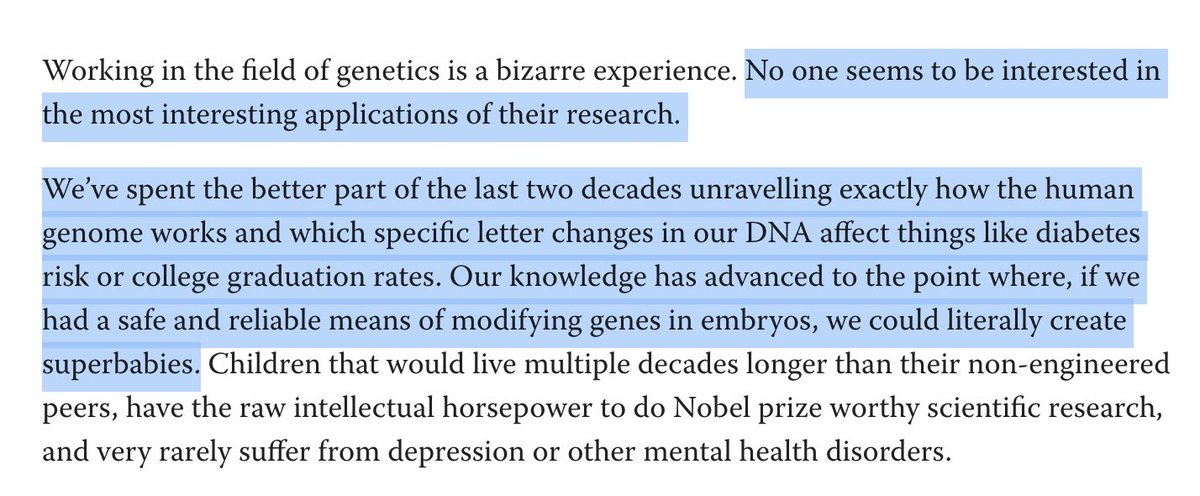
https://twitter.com/ESYudkowsky/status/1892374125089341444First, claim that we already have the knowledge of how DNA affects college graduation rates but no one is interested in applying it. This is false, we almost never know *which* genetic variant is actually causal nor *how* it actually influences the associated trait.

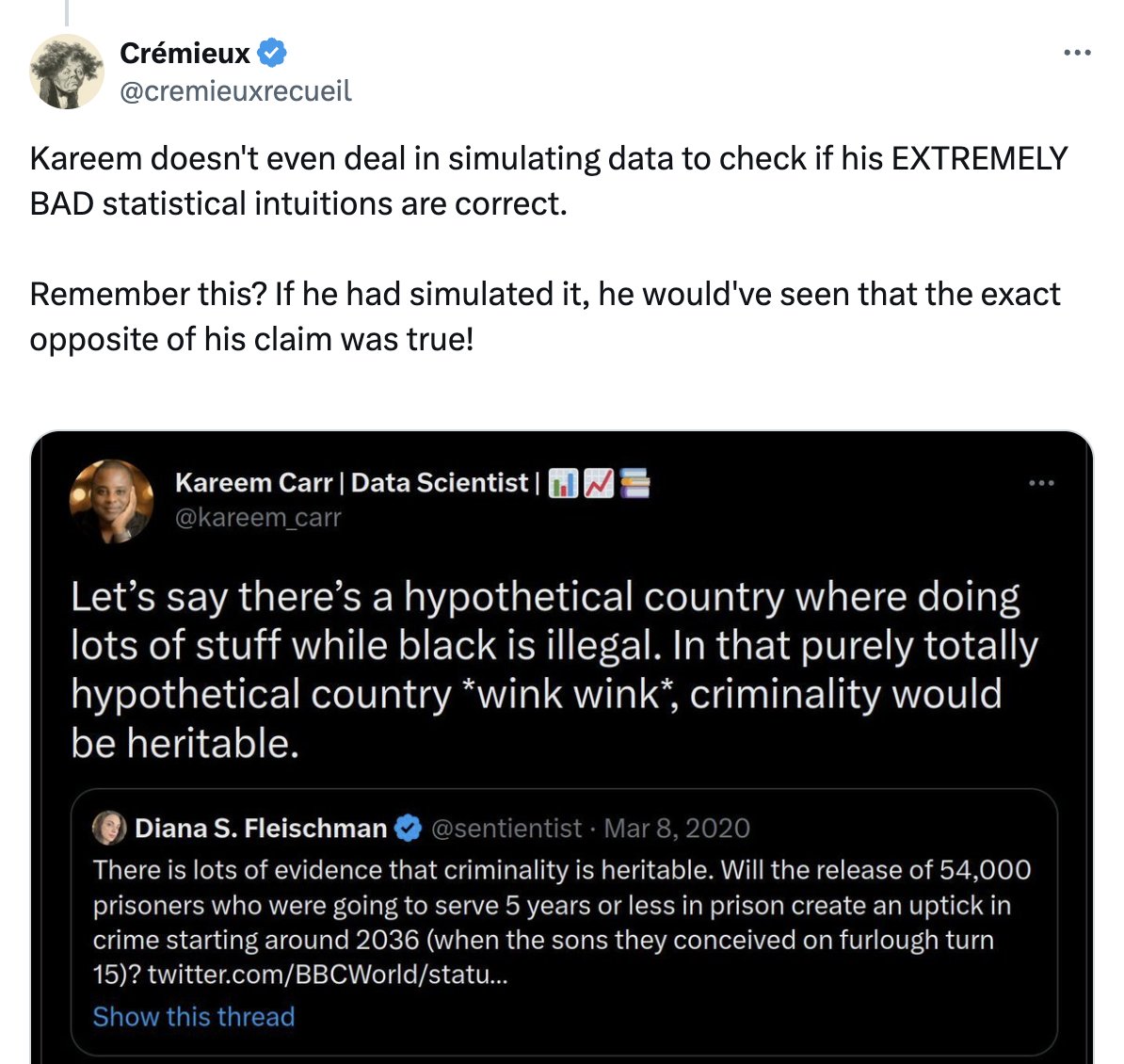
 The fact that these guys were able to cook up a simulation that "disproved" a hypothesis that any intro genetics student knows is TRUE is a testament to how much nonsense people can get up to on here with a poor grasp of R and ggplot.
The fact that these guys were able to cook up a simulation that "disproved" a hypothesis that any intro genetics student knows is TRUE is a testament to how much nonsense people can get up to on here with a poor grasp of R and ggplot. 



 The vast majority of the NIH budget goes towards funding research proposals in some form. I walk through the grant review process but the takeaway is that proposals are evaluated by groups of scientists on importance + rigor and most proposals *do not get funded*.
The vast majority of the NIH budget goes towards funding research proposals in some form. I walk through the grant review process but the takeaway is that proposals are evaluated by groups of scientists on importance + rigor and most proposals *do not get funded*. 


 Accurately detecting loci under selection is complicated by three main factors: neutral drift (which adds noise to allele frequencies), gene flow (which can hide or falsify frequency changes), and background selection (which induces more drift and temporal covariance).
Accurately detecting loci under selection is complicated by three main factors: neutral drift (which adds noise to allele frequencies), gene flow (which can hide or falsify frequency changes), and background selection (which induces more drift and temporal covariance). 


